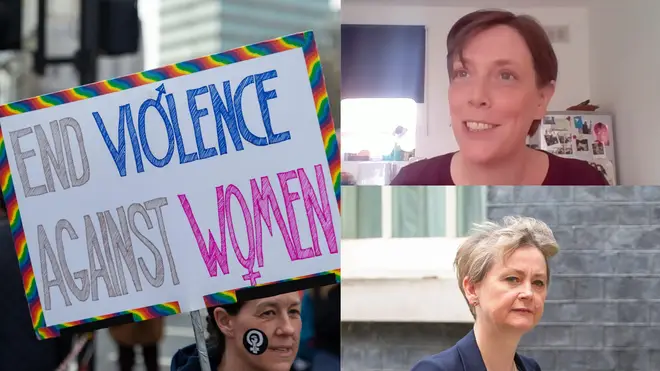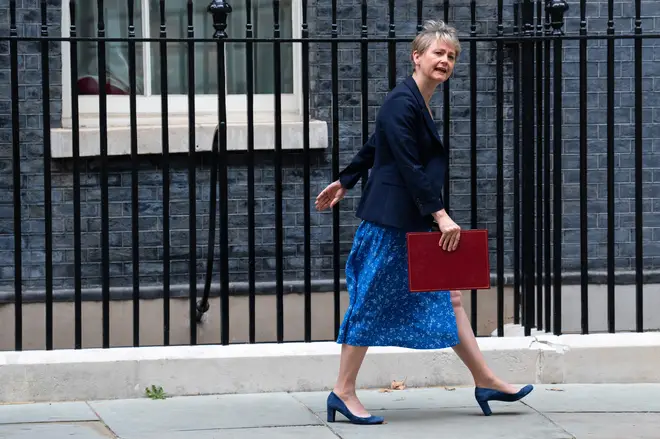
Richard Spurr 1am - 4am
18 August 2024, 11:37

Home Office minister Jess Phillips has told LBC the "massive growing threat caused by online hatred towards women" cannot be ignored following the Home Secretary announcing a fresh crackdown on "hateful beliefs".
Yvette Cooper announced on Sunday a new government strategy to tackle growing extremism which she warned could fray "the very fabric of our communities and our democracy."
She has asked officials to "map extremist trends" to form the basis of "a new strategic approach to countering extremism", including the rise of extreme misogyny.

Speaking to Ben Kentish on LBC, safeguarding and violence against women and girls minister Ms Phillips said the strategy would look to fill in gaps over defining extreme misogyny and insists the policy is about preventing abuse rather than clamping down on free speech.
The MP for Birmingham Yardley said: "The National Police Chiefs Council (have) concerns about the growing rise in misogynistic attitudes among young men, largely because of online content they're seeing.
"This isn't about criminalising people who are showing signs of an ideology, it is about preventing that ideology."

Asked if the strategy could jeopardise free speech, she said: "You just use the exact same test you would with far-right extremism and Islamism, wouldn't you.
"People can hold views about women all they like, but it's not OK anymore to ignore the massive growing threat caused by online hatred towards women and for us to ignore it because we're worried about the line rather than making sure the line is in the right place as we would do with any other extremist ideology."
Read more: Misogyny and sexual threats against teachers rising but 'under-recorded', unions warn
Ms Phillips said tech companies "have to be part of the solution" in tackling extremism given social media's prominence in people's lives and the role it plays in developing extremist views.
She said:"Almost all people spend their life online and so tech companies are undoubtedly going to have to be part of the solution.
"With the previous government's Online Safety Bill, that still hasn't come into fruition yet but we're going to have to make sure that is as robust as possible."
When asked whether the Online Safety Bill will have to be tightened, she said: "We are going to have to have a look across the board (in) this evidential sprint with both academic experts and all of the agencies that deal with this, education and police, look at where the gaps are and seek to fill them."
End the epidemic: Why we need more than promises to stop violence against women and girls

Former Transport Police Chief Constable on why there's now more violent crimes against women on British trains
Ms Cooper had earlier said: "For too long, Governments have failed to address the rise in extremism, both online and on our streets, and we’ve seen the number of young people radicalised online grow.
"Hateful incitement of all kinds fractures and frays the very fabric of our communities and our democracy.
"Action against extremism has been badly hollowed out in recent years, just when it should have been needed most.
"That's why I have directed the Home Office to conduct a rapid analytical sprint on extremism, to map and monitor extremist trends, to understand the evidence about what works to disrupt and divert people away from extremist views, and to identify any gaps in existing policy which need to be addressed to crack down on those pushing harmful and hateful beliefs and violence.
"That work will underpin a new strategic approach to countering extremism from government, working closely with communities to build consensus and impetus for our plans."

Watch Again: Nick Ferrari is joined by Home Secretary Yvette Cooper | 05/08/24
The Home Secretary had criticised the previous government for having no counter-extremism strategy since 2015, and that the lack of a comprehensive approach or practical plans was leaving communities less safe.
The new strategy aims to deliver on the Government's manifesto commitment of preventing people being drawn towards hateful ideologies.
The Home Office says it will look at the rise of both Islamist and far-right extremism in the UK, as well as wider ideological trends, including extreme misogyny or beliefs that fit into broader categories like fixation on violence.
It will also look at the causes and conduct of radicalisation of young people, including the proliferation of dangerous material online.

After the riots that broke out across England following the stabbing of three girls in Southport, a total of 460 people had appeared in magistrates' courts relating to the disorder by the end of Thursday.
At least 72 people under the age of 18 are believed to have been charged.
A number of people have also been handed charges relating to publishing material that contributed to rioting, such as publishing written material to stir up racial hatred or sending a grossly offensive message.